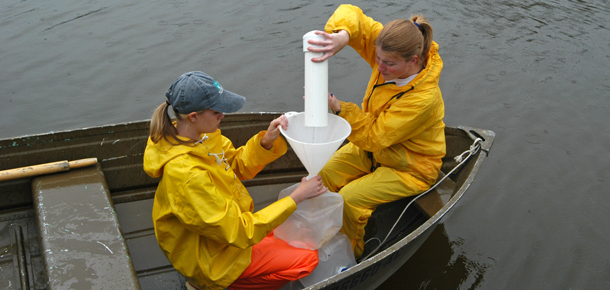Knauss legislative fellowships in Congress help build careers — and they're fun and educational. See our video and fact sheet for details.
Graduate Fellowships

Maryland Sea Grant is committed to enhancing the graduate experience. We offer a number of fellowship opportunities in research, natural resource management, and marine policy that allow graduate students to explore their interests and broaden their experience. Our former fellows have advanced to careers in academia, nonprofit organizations, and state and federal government agencies.
- Meet our current graduate fellows.
- And meet our past graduate fellows.
Competitive Graduate Research Fellowship
Maryland Sea Grant (MDSG) is pleased to announce the Maryland Sea Grant Competitive Graduate Research Fellowship. This is an outgrowth of our recent Coastal Resilience and Sustainability Fellowship. Students apply for a two-year Maryland Sea Grant fellowship that provides stipend, fringe benefits, and a tuition remission allowance. To be eligible, graduate students must be enrolled in a graduate degree program at a Maryland academic institution and engaged in research that is relevant to Maryland and the MDSG Strategic Plan. In addition to financial support, these opportunities will provide additional professional development opportunities in science communication, the science-to-management process, proposal/grantsmanship, and/or other relevant skills.
Maryland Sea Grant Research Fellowships
Maryland Sea Grant invites researchers who have received notice of a pending funding award from the program to apply for funding to support a graduate student as a Research Fellow. Research Fellowships are awarded to graduate students whose research is linked to a Maryland Sea Grant-funded project through a grant from the National Oceanic and Atmospheric Administration (NOAA). The program provides full academic support for up to four years and the opportunity to conduct research alongside an established marine scientist. Consistent with Maryland Sea Grant's mission to integrate research, outreach, and education, fellows also participate in several Sea Grant-supported programs to develop their communication and writing skills. Faculty members may apply for funds to support fellows immediately following Maryland Sea Grant's biennial Request for Proposals.
Knauss Marine Policy Fellowships
Recipients of these one-year fellowships work in marine policy-related positions in the legislative and executive branches of the federal government. Past fellows have worked in the offices of U.S. senators and representatives, on Congressional subcommittees, and at agencies such as the National Science Foundation and NOAA. The fellowship is funded by the National Sea Grant Office and administered through individual state Sea Grant programs. The annual application deadline for this program is in February.
Population and Ecosystem Dynamics and Marine Resource Economics Fellowships
The National Oceanic and Atmospheric Administration (NOAA)-Sea Grant Joint Graduate Fellowship Program in Population Dynamics and Marine Resource Economics is designed to help Sea Grant fulfill its broad educational responsibilities and to strengthen the collaboration between Sea Grant and the NOAA's National Marine Fisheries Service (NMFS). NOAA annually supports a total of four such fellows nationwide. The fellows work on thesis problems of public interest and relevance to NMFS. They have summer internships at participating NMFS science centers or laboratories under the guidance of NMFS mentors. The annual deadline for this program is in January.
Sea Grant Spark Award
Maryland Sea Grant’s (MDSG) Sea Grant Spark Award opportunity offers small awards to support graduate student expenses (e.g., professional development, conference travel, research materials and supplies, analytic services, travel expenses) relevant to their career advancement. To be eligible, graduate students must be enrolled at the University of Maryland Center for Environmental Science or in the USM’s Marine Environmental Estuarine Science graduate program and engaged in research that is relevant to Maryland and the MDSG Strategic Plan. Recipients are encouraged to participate in professional development opportunities offered throughout the year to graduate students supported by Maryland Sea Grant.
Graduate Research Support Grants
Maryland Sea Grant (MDSG) offers support for small graduate research initiatives through our Program Development awards process. These grants support student research expenses (e.g., materials and supplies, analytic services, research travel expenses). To be eligible, graduate students must be enrolled in a graduate degree program at a Maryland academic institution and engaged in research that is relevant to Maryland and the MDSG Strategic Plan. Any student grant recipient is encouraged to participate in professional development opportunities offered by Maryland Sea Grant.




